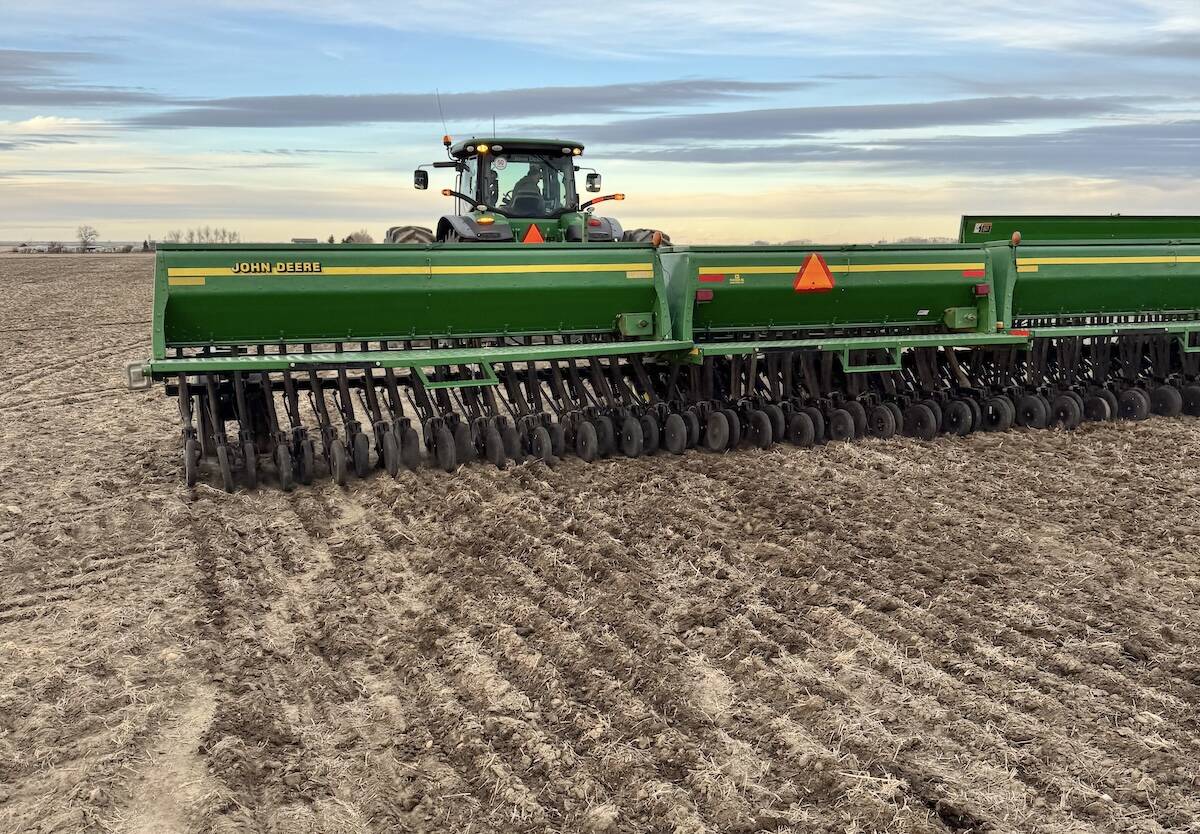You, as Canadian farmers, have had a lot thrown at you over the past two-and-a-bit years. In fact, if I was to create a work of fiction set in rural Western Canada, with large, even far-fetched, hardships for my farm families to overcome, I could not have conjured up more outlandish obstacles than you have faced over the past two years.
A global pandemic? You got the work done. Black swan event? Navigated. Historic drought? You took it in stride. Unprecedented supply chain disruptions and input costs and, then, more pressure on that system due to more factors outside of your control like export restrictions, increasing energy costs and even a war? You’re dealing with it.
You have weathered some of the biggest events and challenges in agriculture in our lifetimes. And still, after these years of uncertainty and adaptation, you are even optimistic about the year ahead. I have to take my hat off to you. You have risen to the occasion(s).
Read Also

Southern Alberta farms explore ultra-early seeding
Southern Alberta farmers putting research into practice, pushing ahead traditional seeding times by months for spring wheat and durum
It’s such a positive story and one I hope garners some attention in the mainstream media this year. Right now, the world needs some good news stories.
Who are the hopeful farmers I mentioned? An RBC agriculture poll conducted by Ipsos Canada surveyed 150 Canadian farm owners and operators between Dec. 10, 2021, and Jan. 6, 2022, where two-thirds of the respondents said they were feeling “cautiously optimistic” about their outlook for the next 12 months. Those producers also said they were prioritizing the following to ensure growth this year, which I think are excellent areas to focus on (if you’re not already doing that) in 2022:
- The majority (85 per cent) said they will cultivate a strong agricultural network to tap into for advice.
- Many (81 per cent) farm owners and operators said they will make recruiting skilled workers a priority this year and 77 per cent said they will try to build up their farms’ leadership teams. Seven out of 10 respondents said they’re making progress with recruiting and promoting a more diverse workforce, and 61 per cent reported female leadership on their farms.
- Many (77 per cent) said they will invest in technology and data-driven decisions. However, the majority (91 per cent) reported they already regularly use technology and data insights to guide their decision-making, with a large number intending to further accelerate on-farm technological adoption. About half of those surveyed anticipate introducing new technology to their operations to support functions like data management (55 per cent), digital field, crop and inventory management (51 per cent), financial planning and cash flow management (47 per cent) and automation (45 per cent).
- Almost three-quarters (73 per cent) said they will focus on risk management planning.
- The majority (96 per cent) reported they are actively working to make their operations more sustainable.
I think these numbers tell an important story about the direction of the ag industry — farm owners and operators are progressive, resilient, forward looking and can weather unpredictable events and disruptions.
Ryan Riese, RBC’s national director of agriculture, said you are shifting your focus and investments to “proactive priorities” to strengthen your operations and cultivating growth, “not only for the year ahead but for the long-term future of the agriculture sector.”
I wonder if the extreme events of the last two years have helped solidify these priorities of strengthening peer and industry networks, recruiting skilled workers, investing in technology, and focusing on workplace diversity, team building, sustainability and risk management planning.
I know in my industry, and particularly at Glacier FarmMedia, these are all areas of focus after two years of uncertainty, disruption and change. Focus on these areas has not been without growing pains; for example, for editors it has meant adopting new technology, learning to rely on data-driven decision-making and embracing integrated media to tell our stories. However, as we move past the growing pains, we are already seeing these focus areas are making us better at serving you, the farmer. These new directions are also bringing vitality to our workplace environment, creating strong teams and networks, and ensuring our relevancy and growth in the future. I’d say we’re also optimistic about the next 12 months.
Although the results of the poll provide insights and food for thought, RBC also suggests farmers keep the following four considerations top of mind when planning for the next stage of growth and evolution:
1. Make risk management part of your everyday decision-making process.
2. Increase adoption of sustainable farming solutions and digital innovations.
3. Expand your knowledge with education and training opportunities.
4. Don’t go it alone.
Risk management is important to your long-term economic success. Risk management activities include regularly scheduled risk assessments, creating cash flow projections, and staying up to date on industry trends, disruptions and farming solutions. Identifying risks for your farm business may seem like a daunting task, especially if you haven’t seriously considered risk management before.
To make the process simpler, RBC has a Risk Management Guide, which is interesting, easy to read and follow and takes you from identifying your risk tolerance to determining the risks in your operation and, finally, offers strategies and tools to manage production, market, financial, legal and environmental and human resource risks. This guide is a great starting point to look at risk management for your operation. You can find the Risk Management Guide online at the RBC website (opens as a PDF).
RBC also suggests investing in new technologies now can pay dividends toward more efficient and sustainable production in the future. Assess your current operations and evaluate if digital solutions can help streamline critical functions such as data management; field, crop and inventory management; financial planning and cash flow modelling and automation.
Also, when considering the growth of your operation, expanding your knowledge with education and training is important. Now more than ever, a broader understanding of business fundamentals is required for farm owners and operators. However, you also have access to information through many excellent, credible institutions across the Prairies as well as Eastern Canada. For example, there is the free online course Foundations in Agriculture Management focusing on managing a modern farm operation offered by the University of Guelph, Farm Credit Canada and RBC. This is the course that was discussed in the April 5, 2022, issue of Grainews. The course is still open for the Summer 2022, Fall 2022 and Winter 2023 sessions starting June 30, September 23 and December 30, respectively.
Lastly, to support growth of your operation in this complex and dynamic industry, don’t try to do it all on your own. RBC recommends leaning on a wide range of employees, partners, suppliers and non-industry collaborators.
However, I’d like to add you can also lean on us, at Grainews, as a resource, our sister publications (Manitoba Co-operator, Country Guide, Alberta Farmer Express, The Western Producer, Canadian Cattlemen, etc.), GFM’s Discovery Farms and Ag in Motion events, Farm Forum Event and Advancing Women in Agriculture conference. Our agriculture partners Metos Canada, MarketsFarm and Weather INnovations are also valuable sources of information.
We are here to support you as you nurture the growth of your businesses and to serve you, your farms and your communities.
Happy seeding,
Kari
















